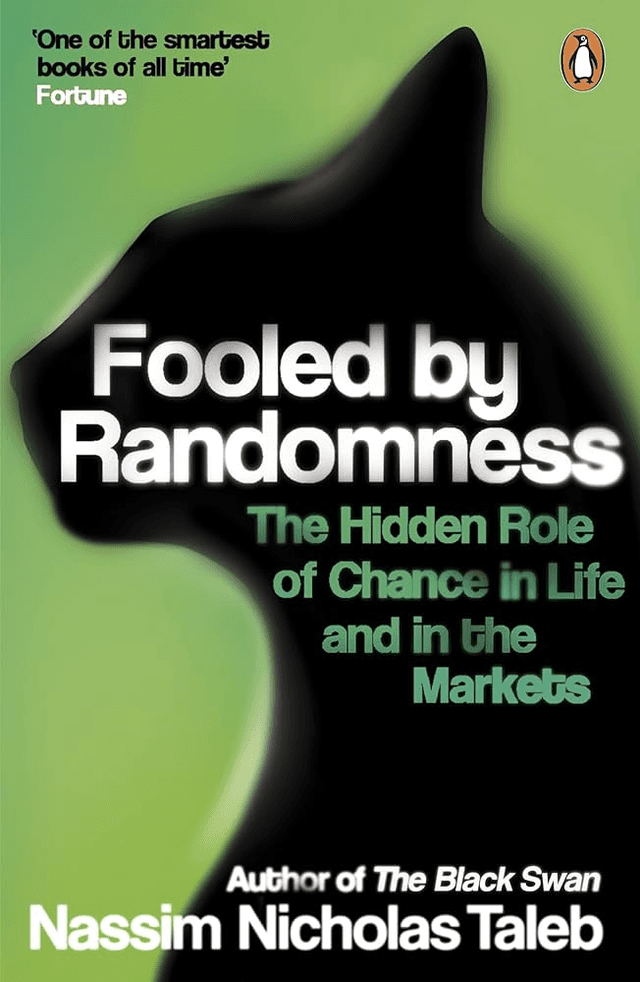Fooled by Randomness vs. Meditations by Marcus Aurelius
Fooled by Randomness
"Fooled by Randomness" is a thought-provoking book by Nassim Nicholas Taleb that delves into the role of chance in our lives and how we often mistake random events for meaningful patterns. Through a mix of personal anecdotes, philosophical insights, and statistical analysis, Taleb explores how randomness affects the world of finance, business, and daily life. The book challenges readers to rethink their perceptions of success, failure, and the forces that drive outcomes. This book is ideal for readers interested in finance, probability, and the philosophical implications of randomness.
Meditations by Marcus Aurelius
From wikipedia: Meditations is a series of personal writings by Marcus Aurelius, Roman Emperor from AD 161 to 180, recording his private notes to himself and ideas on Stoic philosophy. Meditations are worth reading if only to get a glimpse at the thoughts of a man who lived a life in truly extraordinary circumstances of being a Roman Emperor. It's surprising how relevant the themes of his diaries are two thousand years later.

Reviews
Reviews
| Item | Votes | Upvote |
|---|---|---|
| Engaging storytelling | 1 | |
| Thought-provoking concepts | 1 | |
| Insightful analysis on randomness and probability | 1 |
| Item | Votes | Upvote |
|---|---|---|
| Dense statistical discussions | 1 | |
| Can be repetitive | 1 | |
| Requires careful reading to fully grasp concepts | 1 |
| Item | Votes | Upvote |
|---|---|---|
| Practical advice on personal conduct | 1 | |
| Historical insight into Roman times | 1 | |
| Written by a Roman Emperor | 1 |
| Item | Votes | Upvote |
|---|---|---|
| No cons yet, would you like to add one? | ||
Frequently Asked Questions
'Fooled by Randomness' offers a deep dive into the concepts of chance and probability, providing a modern perspective on randomness in various aspects of life, particularly in finance. It challenges readers to rethink their understanding of success and failure. In contrast, 'Meditations' provides timeless Stoic philosophy and practical advice from a Roman Emperor's perspective, focusing on personal conduct and resilience. The choice between the two depends on whether you are more interested in contemporary philosophical insights on randomness or historical reflections on Stoicism.
'Meditations' is generally considered easier to read due to its straightforward prose and practical advice on personal conduct. It is a collection of personal reflections that are accessible and relatable. On the other hand, 'Fooled by Randomness' contains dense statistical discussions and complex concepts that may require careful reading to fully grasp, making it potentially more challenging for some readers.
While both books provide philosophical insights, they approach different themes. 'Fooled by Randomness' focuses on the role of chance and how it influences our lives, particularly in decision-making and success. In contrast, 'Meditations' emphasizes Stoic philosophy, offering guidance on personal conduct and resilience in the face of adversity. Readers seeking insights on randomness and probability may prefer Taleb's work, while those interested in Stoicism and personal ethics may find Aurelius's writings more relevant.
'Fooled by Randomness' is a thought-provoking book by Nassim Nicholas Taleb that delves into the role of chance in our lives and how we often mistake random events for meaningful patterns. Through a mix of personal anecdotes, philosophical insights, and statistical analysis, Taleb explores how randomness affects the world of finance, business, and daily life. The book challenges readers to rethink their perceptions of success, failure, and the forces that drive outcomes. This book is ideal for readers interested in finance, probability, and the philosophical implications of randomness.
Nassim Nicholas Taleb is a renowned essayist, scholar, and former trader known for his work on probability, uncertainty, and randomness. He is the author of several influential books, including 'The Black Swan,' 'Antifragile,' and 'Skin in the Game.' Taleb's work often challenges conventional wisdom and explores the impact of rare and unpredictable events on financial markets and human behavior.
Pros of 'Fooled by Randomness' include engaging storytelling, thought-provoking concepts, and insightful analysis on randomness and probability. However, some readers may find the book's dense statistical discussions challenging, and it can be repetitive at times. Additionally, it requires careful reading to fully grasp the complex concepts presented.
'Meditations' is a series of personal writings by Marcus Aurelius, the Roman Emperor from AD 161 to 180. It consists of his private notes to himself and his ideas on Stoic philosophy. The book offers practical advice on personal conduct and provides historical insight into Roman times.
Pros of 'Meditations by Marcus Aurelius' include practical advice on personal conduct, historical insight into Roman times, and the unique perspective of being written by a Roman Emperor. There are currently no listed cons for the book.
'Meditations' was written by Marcus Aurelius, who was the Roman Emperor from AD 161 to 180.




















